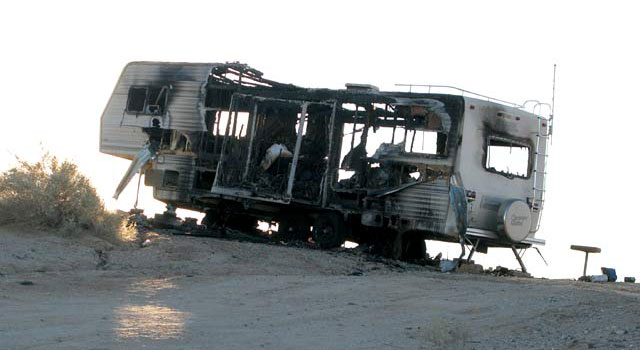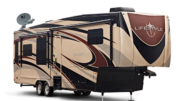When I was a kid, someone — probably my mom — said that a vehicle was the safest place to be in a lightning storm. That person told me that because a car has rubber tires, it’s effectively grounded. Lightning would not strike a car, and therefore if you were in the car then you were safe.
That person was wrong.
I learned quite a while ago that you are pretty safe in a car during a lightning storm, but it’s not because of the rubber tires. It’s because when lightning strikes a car, and it does, the charge will go through the metal skin of the car, through the tires, and into the earth. By and large you’ll be protected unless you’re touching a metal part of the car. You might get a minor shock but it won’t be fatal.
Convertibles, motorcycles, and other vehicles are not safe from lightning, as many an open-air driver has discovered. More importantly for this article, vehicles made of fiberglass are not safe from lightning either. That means most RVs. So unless you’re in one of those old Airstream campers, you should be thinking about grounding a lot more than you probably do.
Proper grounding of an RV
Firstly, I hate to be the one to break this to you. There’s practically no way to ground any vehicle while it’s moving. Lightning strikes can happen to moving vehicles, although it’s rare. Unfortunately it’s just part of the risk you take. The risk of a lightning strike while driving is lower than the risk of being in an accident, though, and most folks don’t worry about it.
Once you’re parked, you should do something to ground the RV. In most cases it’s easy. If you’re hooked up to an electrical connection in an RV park, you’re grounded because the connection is grounded. So you’re safe. If you’re not hooked up that way, you’ll need to find a way to ground the RV yourself.
Grounding using the electrical panel
The first thing you should do is look at the RV’s electrical panel. Some of them will have a specific screw which will let you connect a ground wire. If yours does, then connect a proper ground wire to it.
If your RV doesn’t have a designated ground screw, look for a part of the panel which is bare metal and where you can attach a ground strap or some other grounding aid. Connect it to that bare metal and to a ground wire.
Grounding using the chassis
If your electrical panel doesn’t have a designated area just for grounding, or if it’s covered in plastic or you just can’t figure out a way to connect anything to it, the next best thing to do is use the RV’s chassis for a ground. Look for part of the chassis that is bare metal and with a bolt you can loosen enough to attach a ground wire. You may be able to use a trailer hitch if you are sure it’s connected to the chassis, or you may be able to use an area in the engine compartment. The worst case scenario would be using something in the undercarriage where you’d have to disconnect the ground wire every time you moved.
How to attach the grounding wire to the earth
Proper grounding comes down to making sure there’s a path for stray electricity to travel into the dirt. There are two popular ways to do this. The easiest in an RV situation is probably to use a ground rod. This is nothing more than a metal post that you hammer in and attach the ground wire to. It’s really that easy.
Another option, depending on what you can find when you park, is to attach the ground wire to something metal sticking out of the earth already. You can use a street sign, a water pipe, or anything you can find that will let you secure the grounding wire.
Especially with temporary setups, it’s more important that you do it than it is that you do it perfectly. Connecting a ground wire to “something metal” in the RV and then connecting the other end to “something metal” sticking out of the earth is a whole lot better than doing nothing at all.
Get everything you need from Solid Signal
SolidSignal.com is your source for everything you’ll need to turn your RV into a high-tech home away from home. Whether you’re looking for a way to add TV, cell service, satellite, or even internet service to your RV, you’ll find it all! Plus you’ll get the best customer service when you call us during East Coast business hours. You can reach our corporate offices in the Detroit suburbs by calling 888-233-7563.





